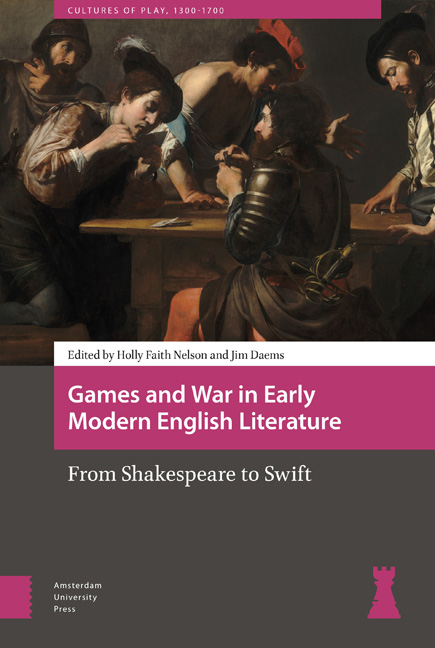Book contents
- Frontmatter
- Dedication
- Contents
- Acknowledgements
- The Interplay of Games and War in Early Modern English Literature: An Introduction
- 1 ‘Can this cock-pit hold the vasty fields of France?’ Cock-Fighting and the Representation of War in Shakespeare’s Henry V
- 2 Game Over: Play and War in Shakespeare’s Troilus and Cressida
- 3 Thomas Morton’s Maypole: Revels, War Games, and Transatlantic Conflict
- 4 Milton’s Epic Games: War and Recreation in Paradise Lost
- 5 Ciphers and Gaming for Pleasure and War
- 6 Virtual Reality, Role Play, and World-Building in Margaret Cavendish’s Literary War Games
- 7 Dice, Jesting, and the ‘Pleasing Delusion’ of Warlike Love in Aphra Behn’s The Luckey Chance
- 8 War and Games in Swift’s Battle of the Books and Gulliver’s Travels
- 9 Time-Servers, Turncoats, and the Hostile Reprint: Considering the Conflict of a Paper War
- Index
4 - Milton’s Epic Games: War and Recreation in Paradise Lost
Published online by Cambridge University Press: 21 November 2020
- Frontmatter
- Dedication
- Contents
- Acknowledgements
- The Interplay of Games and War in Early Modern English Literature: An Introduction
- 1 ‘Can this cock-pit hold the vasty fields of France?’ Cock-Fighting and the Representation of War in Shakespeare’s Henry V
- 2 Game Over: Play and War in Shakespeare’s Troilus and Cressida
- 3 Thomas Morton’s Maypole: Revels, War Games, and Transatlantic Conflict
- 4 Milton’s Epic Games: War and Recreation in Paradise Lost
- 5 Ciphers and Gaming for Pleasure and War
- 6 Virtual Reality, Role Play, and World-Building in Margaret Cavendish’s Literary War Games
- 7 Dice, Jesting, and the ‘Pleasing Delusion’ of Warlike Love in Aphra Behn’s The Luckey Chance
- 8 War and Games in Swift’s Battle of the Books and Gulliver’s Travels
- 9 Time-Servers, Turncoats, and the Hostile Reprint: Considering the Conflict of a Paper War
- Index
Summary
Abstract
The epic tradition, upon which Milton relies in Paradise Lost, raises a number of issues in portraying a war in Heaven: angels, fallen or not, are immortal; the fallen angels cannot possibly defeat God; and their penchant for games tends to pull the War in Heaven from epic into mock heroic. Similarly, Satan's encounter with Gabriel is not like the tragic and heroic encounter of characters such as Achilles and Hector because God forestalls that possibility. This chapter argues through a close analysis of classical allusion in Paradise Lost that, in representing the War in Heaven, Milton suggests that it is neither fully game nor fully war as God presides over both recreation and decreation.
Keywords: Milton and Lucretius; epic conventions; Milton and intertextuality; Milton's God
Immediately before Milton's God turns the course of the War in Heaven, Raphael presents the state of play for his human audience as follows: ‘war seemed a civil game / To this uproar’. This chapter is in part an extended exegesis of this pivotal clause that concatenates four concepts central to the poetics of Paradise Lost: war, civil war in particular, games, and the relation of seeming. It is a complex textual and intertextual moment. Raphael, accommodating his account of celestial events to human apprehension, evokes the ostensibly legible domain of terrestrial warfare but unmoors it rhetorically. In fact, Raphael's narration is Adam and Eve's introduction to the concept of war: war will dominate much of Michael's presentation to Adam in the final books, but it is not part of their prelapsarian experience. The intensification of destruction and horror implied by ‘war seemed a civil game / To this uproar’ challenges not only the innocent imaginations of the Edenic pair, but also the historical imagination of the poem's readers: compared to the uproar of the War in Heaven, the catastrophe of human warfare appears a polite interlude. This characteristically Miltonic tripartite comparison disorients with its play of scale, like Satan's spear (1.292-1.294) or the universe seen ‘in bigness as a star / Of smallest magnitude close by the moon’ (2.1052-2.1053). But the ‘civil game’ figure dizzies with involution as well as scale: the placement of the loaded term ‘civil’ worries the rhetorical structure, the more so for containing an allusion to the famous comparative by which Lucan announces his epic theme as bella […] plus quam civilia (‘war worse than civil’).
- Type
- Chapter
- Information
- Games and War in Early Modern English LiteratureFrom Shakespeare to Swift, pp. 73 - 94Publisher: Amsterdam University PressPrint publication year: 2019

